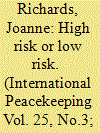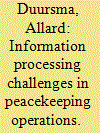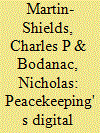|
|
|
Sort Order |
|
|
|
Items / Page
|
|
|
|
|
|
|
| Srl | Item |
| 1 |
ID:
159141


|
|
|
|
|
| Summary/Abstract |
Attention to everyday forms of resistance in the liberal peace debates has provided a more sophisticated critique of peacebuilding but the concept of resistance remains limited. The paper argues that this is because leading approaches to resistance coming out the hybridity literature lack an account of class and privilege. These approaches have done a superficial application of the frameworks they were drawing on, primarily those of Michel De Certeau and James Scott. Resistance has been conceived as an international–local and liberal–non-liberal contention. The conclusion is that while the study of resistance is welcomed, this research agenda is limited and depoliticizing. Critics of hybridity have addressed similar points, taking issue with the account of the local, the lack of historicity and the reification of liberal norms. However, in seeing these problems as stemming from the everyday framework, they too have misread the importance of class and privilege therein. The article shows that Certeau and Scott have much to contribute to understanding peacebuilding processes by sustaining a sociological historicist and practice-based account of resistance as embodied in subordinate subjects. This has the potential to politicize, historicize and decolonize the liberal peace critique and to contribute to studying resistance in IR more generally.
|
|
|
|
|
|
|
|
|
|
|
|
|
|
|
|
| 2 |
ID:
159143


|
|
|
|
|
| Summary/Abstract |
Programmes of disarmament, demobilization, and reintegration (DDR) are increasingly implemented in contexts of violent extremist conflict. In such settings, DDR practitioners may need to distinguish between ex-combatants who can be safely reintegrated into civilian life, and ex-combatants who are likely to present a danger to the community in terms of violent and/or extremist re-offending. To help practitioners make this assessment, this paper explores how risk assessment tools used by psychologists in criminal justice settings may be adapted to screen for violent extremist offenders in DDR programmes. The findings suggest that the method of structured professional judgment (SPJ) can be used to assess the risk that individual ex-combatants will re-offend upon return to civilian life. By extension, SPJ can also: (1) help practitioners to understand what type of deradicalization and disengagement programming former members of extremist groups may require and (2) contribute to decisions concerning the release of ex-combatants from prisons and transitional DDR centres.
|
|
|
|
|
|
|
|
|
|
|
|
|
|
|
|
| 3 |
ID:
159146


|
|
|
|
|
| Summary/Abstract |
Information analysts are often hindered by uncertainty, complexity, ambiguity, and equivocality when trying to support peacekeeping operations. This article puts forward a conceptual framework that explains what each of these information challenges entails and how uncertainty, complexity, ambiguity, and equivocality hamper peacekeeping efforts. To assess the conceptual value of linking these information challenges to peacekeeping efforts, this article zooms in on the information support system within the United Nations Multidimensional Integrated Stabilization Mission in Mali (MINUSMA), though other cases are also considered. The peacekeeping information collection and analysis efforts in Mali illustrate that peacekeeping missions ideally should be equipped with the capacity to overcome information challenges related to uncertainty and complexity in order to support the tactical and operational level of peacekeeping missions. In order to understand decision-making context and support the strategic level, it is also important that information analysts within peacekeeping mission can reduce information challenges related to ambiguity and equivocality. The importance of understanding the decision-making context speaks to the emphasis on sequenced mandates in the High-level Independent Panel on Peace Operations (HIPPO) report. In order to timely adjust the mandate of a peacekeeping mission, the leadership of a peacekeeping mission needs to be alerted of any changes in the decision-making context.
|
|
|
|
|
|
|
|
|
|
|
|
|
|
|
|
| 4 |
ID:
159145


|
|
|
|
|
| Summary/Abstract |
Peacekeeping operations, mandated through the United Nations and regional bodies, play an increasingly diverse role in the economic development of post-conflict countries. A key way that missions can use their administrative capacity to support economic recovery is developing effective technology use and acquisition strategies in host countries, which is a peacekeeping-wide policy goal outlined in the high-level Performance Peacekeeping report. Our paper introduces the theoretical channels through which missions’ use of information communication technologies (ICTs) can support local economic development in post-conflict settings, making a theoretical argument that draws on both the literature on ICTs in peacekeeping and in economic development. We specify a Cobb–Douglas model that describes the potential impact of peacekeeping mission-led ICT investment on longer term economic development in combination with statistics on mission technology spending and internet use in host countries, providing a formal scaffold for our theoretical argument. Using this model and data in combination with a case study of the Central African Republic-based United Nations Multidimensional Integrated Stabilization Mission in the Central African Republic mission, we argue that peacekeeping missions should use their purchasing power and stabilizing influence to attract value-added technology investment to support economic development.
|
|
|
|
|
|
|
|
|
|
|
|
|
|
|
|
| 5 |
ID:
159142


|
|
|
|
|
| Summary/Abstract |
Disarmament, Demobilization, and Reintegration (DDR) is fundamental in remaking post-war relationships. This article draws on two sets of field research data from Liberia to highlight the role of social capital in shaping DDR outcomes. The way reintegration is communicated and implemented can have a direct impact on all three elements of social capital: promoting norms, developing social networks, and building (or undermining) relationships and trust. These components of social capital are directly influenced by reintegration, while also feeding back into how reintegration progresses and is experienced. More specifically, new and existing networks used by ex-combatants as a way to navigate the post-war environment are an important element of social capital, as it goes through all kinds of distortions and transformations. These networks are important for the survival strategies at work, especially when there are shortcomings in the DDR process. Finally, a further layer is suggested: that social capital is a factor mediating how reintegration contributes (or not) to peacebuilding as a whole.
|
|
|
|
|
|
|
|
|
|
|
|
|
|
|
|
| 6 |
ID:
159144


|
|
|
|
|
| Summary/Abstract |
The literature on the effectiveness of peacekeeping has been focused almost exclusively on conflict mitigation. This article expands the scope of this literature by developing a theory that explains how the presence of peacekeeping forces improves population health during periods of intrastate conflict. The argument is put forth that because civil conflict violence clusters geographically it undermines the herd immunity critical-mass threshold. This, in turn, leads to increased infection rates and a tragic surge in preventable deaths. Peacekeepers, because they target conflict ‘hot spots’ locally, put an end to this cycle and assist in the restoration herd immunity. Using a unique measure of peacekeeping that accounts for the area of the conflict zone, the empirical models uncover a positive relationship between peacekeeping forces and immunization rates, as vaccination rates increase when peacekeepers are deployed into violent conflicts. These findings suggest that peacekeeping missions have the potential to reduce the public health costs imposed by internal conflicts.
|
|
|
|
|
|
|
|
|
|
|
|
|
|
|
|
|
|
|
|
|